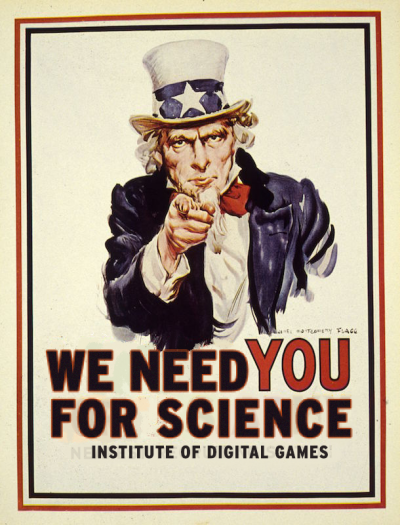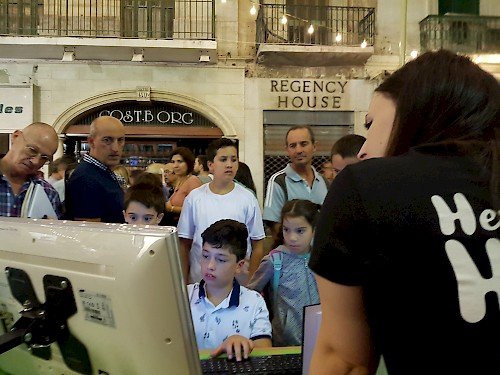
COMnPLAY-Science project: Questionnaires for Science Learning - Video games in Education Research


The COMnPLAY SCIENCE project examines non-formal and informal science learning through coding, making, and playing thereby helping understand the new ways that young Europeans are nowadays increasingly engaged with, outside school and higher education science classrooms, beyond the formal boundaries of science education. To that end we have two surveys we would like to use to collect data on the experiences of children and parents/teachers/educator.
Children Coding, Making, and Learning Science
The present survey is part of the COMnPLAY-Science project (you can read more about the project here: https://comnplayscience.eu/). The survey is directed to (pre-college) children who have participated in coding, making or play activities in the context of out-of-school science learning (e.g., coding clubs, robotics at home, science museum visits, after school activities, online coding seminars).
The questionnaire is anonymous and data collected will be used for educational and research purposes solely.
The aim of this survey is to investigate attitudes and values that young learners may develop through out-of-school science learning, towards science, scientists, and science-related information in everyday life. With the term science learning, we refer to subjects related to science (e.g. chemistry, biology, physics), technology, engineering and mathematics. Our major goal is to identify the role of the various out-of-school science learning activities on young people’s involvement in science.
Time of survey's completion is approximately 15 mins.
CLICK HERE TO COMPLETE THE SURVEY FOR CHILDREN

Parents, instructors, and policy makers involved in Science Learning
The present survey is part of the COMnPLAY-Science project (you can read more about the project here: https://comnplayscience.eu/). The survey is directed to people who have been involved/experienced in coding, making or play activities in the context of out-of-school science learning (e.g., instructors in coding clubs, parents of children engaging with robotics, curators of science museums, school teachers organizing relevant after school activities, designer/developer of relevant online resources).
The questionnaire is anonymous and data collected will be used for educational and research purposes solely.
The aim of this survey is to investigate attitudes, values and dispositions that young learners may develop through out-of-school science learning, towards science, scientists, and science-related information in everyday life. With the term science learning, we refer to subjects related to science (e.g. chemistry, biology, physics), technology, engineering and mathematics. Our major goal is to identify the role of the various out-of-school science learning activities on young people’s involvement in science.
Time of survey's completion is approximately 10 mins.
CLICK HERE TO COMPLETE THE SURVEY FOR ADULTS
Game based Learning: Science through coding, making, and playing

Teaching coding is currently gaining momentum across the world to help young people develop technological fluency and deeper understanding of how the digital world is created, how it might be used to meet our needs, how we might repair or modify it. At the same time, the maker movement of independent innovators, designers and tinkerers has dynamically entered the landscape of innovative education and non-formal and informal learning, offering an unprecedented opportunity for educators to advance a progressive educational agenda. Across the spectrum of these emerging creative learning activities, the elements of fun and playfulness are dominant harnessing children’s sense of joy, wonder and natural curiosity, achieving high levels of engagement and learner’s personal investment in learning. The links and contributions of these creative learning approaches and activities to science education are strong and obvious, albeit still only little explored and understood in depth.
Benefits of Games in Education: Learning through games in and out of the classroom
What ComNPlay Science aims to accomplish in the short term, is to identify good practices in terms of science education outside the classroom and consider the impact this information has on formal and non-formal and informal science education for students and citizens. Through in-depth research, the project will gain valuable new knowledge on the nature and impact of this kind of non-formal and informal science learning, which it will then apply to shed new light on all of the practices identified at the outset.
In the medium term, the results of the project are expected to help the EU to better understand the effects of science education outside the regular education institutions and increase the range of innovative products in science education that reflect societal needs. Additionally, concrete project outcomes will open up ways for the development of further relevant initiatives – already in the course of the project and sustainably after the end of the funded project period.
In the long term, the results of the project are expected to contribute to considerations on accrediting the available information. Paving the way to achieving an accreditation of non-formal and informal science education through coding, making and play activities in the future.
In addition to the above contributions, the project constitutes a much needed, very timely intervention with an important wider impact on the worlds of science learning, scientific citizenship, and on society at large. The new understandings and knowledge generated by the project also create new market opportunities, as they enable European societies and economies to develop innovative initiatives, products and services, readily available to enrich and innovate formal science education and traditional non-formal and informal science learning interventions.
Types of Educational Games
The Institute of Digital Games has been actively combining games and education in much of their research. The CURIO, eCrisis, and Envisage projects all focus on harnessing the power of games for education. Video games can be a useful learning tool and furthermore it is a tool that can be enhanced with artficial intelligence and virtual laboratories as demonstrated in the eCrisis and Envisage projects also run by the Institute of Digital Games. An example of the education-oriented games developed at or with the Institute includes: ENVISAGE virtual labs, Iconoscope, Will Love will tear us apart, Village Voices, Something Something Soup Something, DATA Agent.
Gaming in Education
The Institute of Digital Games is a research-oriented University Institute and gaming in education or "serious games" is at the core of much of its research. If you'd like to be kept up to date on our video game research and other events, such as seminars on didactic methods related to games, we invite you to subscribe to our Newsletter below. There is sure to be something to interest you!

